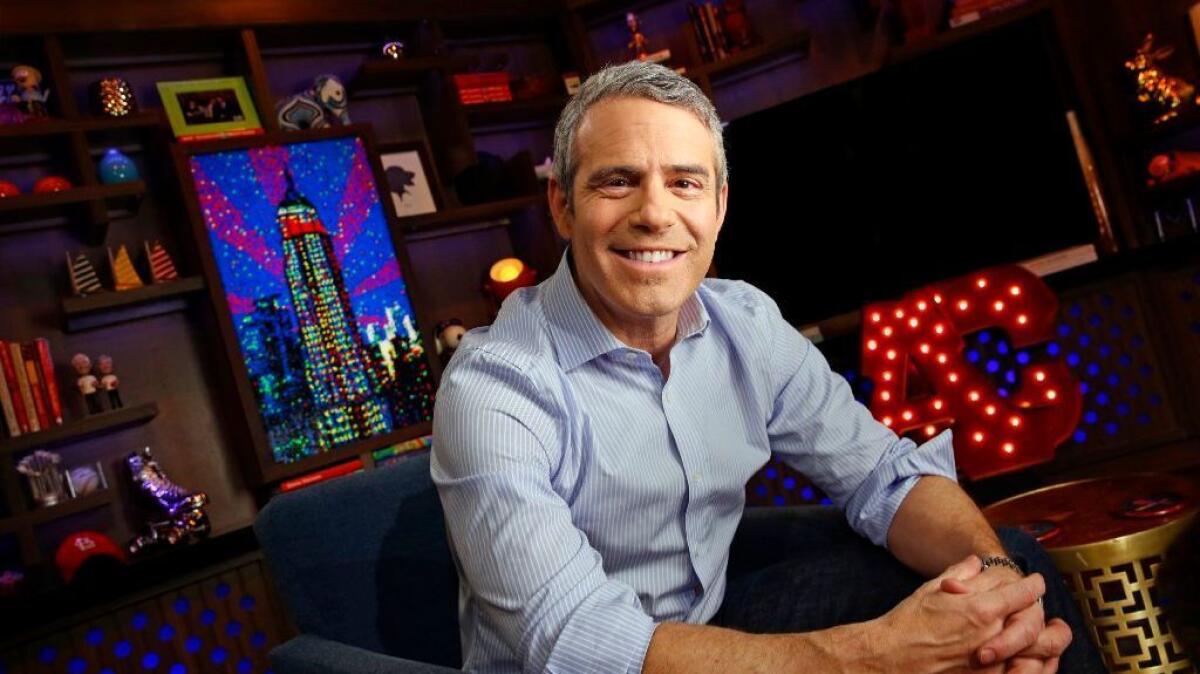Watch what happens when Andy Cohen talks about his growing empire

- Share via
Andy Cohen is a busy man. “I subscribe to the [Ryan] Seacrest-ian model of employment, which is to keep adding things that I love,” he says, and his résumé proves it. The former Bravo exec is now host and executive producer of the network’s “Watch What Happens Live With Andy Cohen” and EP of “The Real Housewives” franchise. He has a SiriusXM “Radio Andy” channel, is a bestselling author with his Andy Cohen Books imprint, tours with
But that crazy workload didn’t stop him from offering The Envelope's Randee Dawn the interviewer’s seat on the set of “Watch” and … well, watch what happened.
Were you always this way growing up, hyper-busy?
I was always active and social, but no — this is pretty much how I'd want it to be. I would be lying if I said it was all by design, though. It's all so random, but it happened really organically, and I love that.
You have so many jobs, you must feel very secure — no one boss can ever show you the door, right?
It’s funny, because I was thinking recently of what if one of the big things I do went away, what would I do? Wow, what if I only got to run my radio channel? What if I was only EP of the “Housewives”? What if I was only running Andy Cohen Books? It's a great amount of security in an industry with very little security.
Early on you must have gotten flak, as in “Who is this Bravo executive who thinks he can be on-air talent?”
Which is the biggest insult to so many people. It was the thing early on in my career that got under my skin, when people would say I greenlit my own show. It's not possible. My bosses were
Do you think you got to develop “WWHL” the way you wanted because the network never dreamed anyone would tune in at midnight?
One hundred percent. If people found it they were pleasantly surprised, and it was weird. We’re the only live show in late night, and the only interactive one. I wanted to prove to Bravo that I could do more with this little show than they had imagined — they weren't expecting me to book huge names like
When you were first entering the business, being gay was still not something you could be fully out about. How did that affect your early career?
I was an intern in 1989, my junior year, at CBS News. Julie Chen and I were interns together. There were a lot of closeted gay guys at CBS News and people think, “CBS News? Staid.” It was. I was in the closet as an intern to everyone around me, but when I came back [full time] — it wasn't something I made a big deal about. It’s always been a part of me, but doesn’t define me wholly. I’m the only gay talk show host in late night, but it’s not a gay talk show. The funny thing is I interviewed for a job running programming at Logo, and I thought, there's no gayer TV executive than me — I have to get this job. And they didn’t hire me! Thank God; everyone views me as Bravo Andy now.
If you’d ended up at Logo you might not have had the kind of stealth impact you were able to have at the more mainstream Bravo.
One thousand percent. They didn’t want to do a gay dating show, they didn't want to have drag queens on Logo at the time. They told me that explicitly. They wanted to appeal to women, but also to be a gay channel. Bravo was gayer than Logo and appealed to women and their gay best friends.
So you have “Then & Now,” which will be full of nostalgia and pop culture references. Hundreds of years ago, “nostalgia” was actually seen as a mental illness.
They also thought gay people were defective back then.
Touché! So with that, plus “Love Connection,” are you likely to add on yet more jobs?
I always say you get to work in TV, you don't work in TV, and that's important to remember because we're not curing cancer. But it's really fun and people really connect to it in a significant way. I don't take that lightly. I just like having fun and being passionate about everything. If I don't give a … about something, I'm not going to do it. Right now, though, I kinda feel like I've maxed out.
From the Oscars to the Emmys.
Get the Envelope newsletter for exclusive awards season coverage, behind-the-scenes stories from the Envelope podcast and columnist Glenn Whipp’s must-read analysis.
You may occasionally receive promotional content from the Los Angeles Times.







